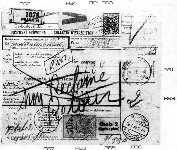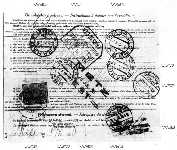|
|
|
|
|
|
While rummaging through a fellow
collector's stock at a bourse about a year ago, my eye caught a postal
dispatch form card with imprinted revenue stamp used for
international parcel service in 1930. The form, having traveled through the
mails for a full seventy calendar days, appeared to illustrate some features
characteristic of international parcel post service of that period. That led
me to trace its full travel itinerary. I owe a major part of my findings,
particularlz with respect to means of transportation and postal routes of
contemporary Germany, France and Morocco to Mr. Svatopluk Zampach.
The form used for international parcel dispatch bears a Czech-French text.
It was initiated (i.e. filled out) on the 24th of July, 1930 at 8 a.m. and
received the dispatch number 1076 (Fig. 1, RS 2) at the PRAGUE 24 post
office, where it was post marked (RS 1). The imprinted 50h revenue stamp (RS
3) was canceled with the regular post mark (same as RS 1) which was applied
the same day. The object of the dispatch was a box valued at 1,152 Kc. In
accordance with the regulations of the International Postal Union, this
value was also expressed as 164,58 gold francs. Due to its value, the
adhesive label "V" (black on white background) was applied (RS 4).
The sender paid in accordance with its weight (9,50 kg) - 41,65 Kc plus
insurance of 3,50 Kc in addition to a so-called "expedition fee"
of 2,50 Kc - i.e. a total of 47,65 Kc. Proof of payment is the post mark
itself in the space marked "Dispatch Post Mark" (RS 1) rather than
stamps, which at that time were not used for prepayment of international
parcel mail. The destination of the shipment was the port of Mazagan in
Morocco. From the PRAGUE 24 post office the shipment was transferred to the
main customs office in Prague (Fig. 2, WS 1) which passed it as "free
of duty and routed it by train to the border post office of CHEB 2. The
latter was the departure post office for Germany and for mail passing
through Germany, as shown by the direction label (RS 5). The shipment was
transferred at the railroad postal station KARLSRUHE 2 in the State of Baden,
Germany on July 26, 1930, between the hours of 6 and 7 p.m. (RS 6). The
international window of this post office applied the marking AUSLAND. I.e.
ABROAD in the lower portion of the marking and passed the shipment on to the
postal railway car, i.e. ambulatory postal station Karlsruhe - Strassburg -
Metz in Alsace, France. The collection and transit post office in Metz
applied the marking (WS 2) directing the shipment east, i.e.
"EST". From there it is presumed to have been forwarded by rail to
a "TRAMP" streamer, which generally traveled along the coast
touching many ports, arriving on the 15th of September at the Moroccan
Atlantic port of Mazagan (RS 7). In accordance with local regulations the
shipment was charged 10 centimes "manipulation fee" as evidenced
by the Moroccan revenue stamp (RS 8). It is difficult to determine why the
shipment could not have been delivered to the addresse, since the form bears
no such notation. The fact is that the box was to be returned to Prague. The
heavy blue pencil notation reads "Non Reclame - Retour" (Undeliverable
- Return) and the original delivery address is crossed out. At the main post
office in Casablanca the form was post marked with a red "return"
marking (RS 9), and was dispatched on its return journey.
Hence again by steamer and train to Metz (without post mark) and thence to
Karlsruhe, where it was post marked on October 2nd between 10 and 11 a.m.
(WS 3). On October 5th at 6. a.m. the shipment was received at the PRAGUE -
CUSTOMS postal station (WS 4) where it was again processed and transferred
on October 7th, 1930 to the PRAGUE 22 post office, window 7a (WS 5), which
in turn transferred the shipment to the care of the clerk at window 4b, who
applied a 50h postage due stamp (Scott J63) which he canceled. On the same
day the shipment was delivered to the originator at 12 noon as "undeliverable".
Receipt of the shipment was confirmed by the signature and rubber stamp (of
the firm) … Hermann, factory for the manufacture of shoes (WS 8).
Thus ended the trail of the box
from Central Europe to North Africa and back. The trail of the dispatch form
would have ended as postal scrap (since it had to be surrendered)
and hence would have met its demise, particularly since it was stampless,
except for a person, somewhere along the line, with an eye to collecting.
Yet, thought this item tells a long and arduous story, its renaissance had
to wait until now, when it has become a valued source of information for
today's generation of postal history buffs.
|
![]()



